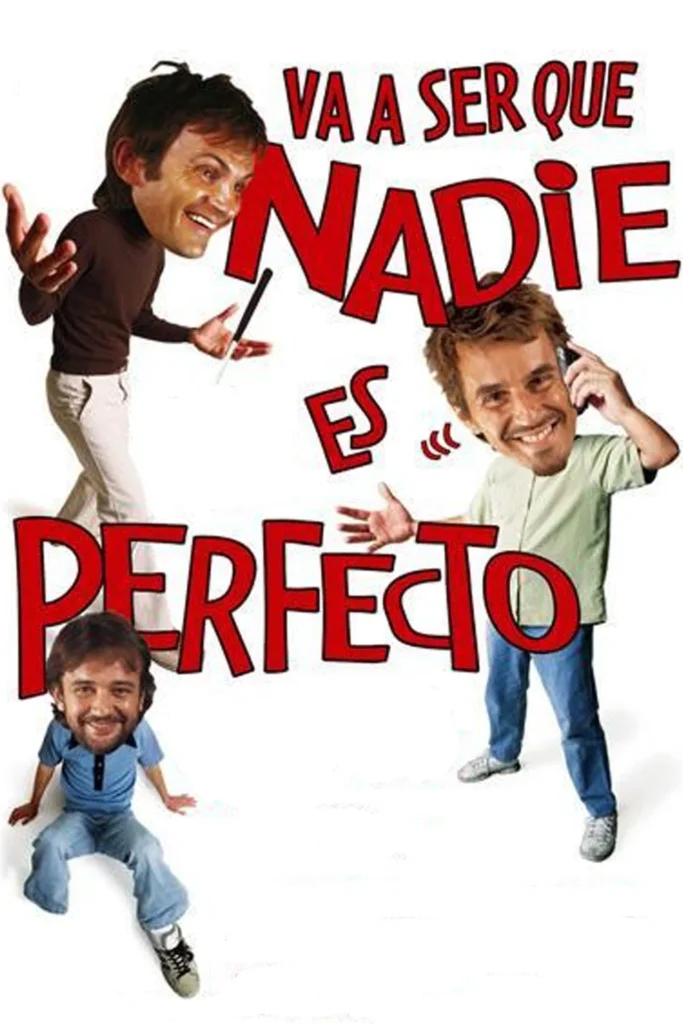
Director: Joaquín Oristrell
Writer: Albert Espinosa
Genre: Comedy, Drama
Runtime: 96 minutes
Language: Spanish
Country: Spain
Production Companies: Diagonal Televisión, Mediapro, Pentagrama Films
IMDb Rating: 5.3/10
Filmaffinity Rating: 5.3/10
Plot: A Night of Revelations
Va a ser que nadie es perfecto (translated as Nobody’s Perfect) is a 2006 Spanish comedy that follows the story of three lifelong friends: Carlos (Fernando Tejero), who is blind; Rubén (Santi Millán), who is deaf; and Dani (José Luis García Pérez), who has a physical disability. As Carlos prepares to marry his longtime girlfriend, his friends organize a bachelor party that leads to unexpected adventures and self-discovery. The film delves into themes of friendship, love, and the challenges faced by individuals with disabilities, all portrayed with humor and sensitivity.
Themes: Embracing Imperfections
The film explores the lives of individuals with disabilities, highlighting their experiences, challenges, and the societal perceptions they navigate. By focusing on the camaraderie among the three friends, the narrative emphasizes the importance of acceptance, understanding, and the celebration of differences. The story challenges stereotypes and encourages viewers to see beyond physical limitations, fostering empathy and inclusivity.
Cast: Portraying Authentic Connections
Fernando Tejero as Carlos, the blind friend whose impending marriage serves as the catalyst for the story.
Santi Millán as Rubén, the deaf friend known for his lively spirit.
José Luis García Pérez as Dani, who has a physical disability and adds depth to the trio’s dynamic.
Teresa Hurtado de Ory as Patricia, Carlos’s fiancée.
Mercè Martínez as Yolanda, adding to the ensemble’s richness.
The chemistry among the lead actors brings authenticity to the portrayal of deep-rooted friendships, making their interactions both relatable and heartwarming.
Reception: A Mix of Praise and Critique
Upon its release, the film received a mixed reception. While some praised its heartfelt narrative and performances, others critiqued it for relying on clichés. Despite this, it achieved commercial success, becoming one of the top-grossing Spanish films of 2006 with over 800,000 viewers. It also garnered awards, including Best Screenplay at the Peñíscola Film Festival.
The Critic’s Verdict
Va a ser que nadie es perfecto offers a touching exploration of friendship and the human experience, particularly focusing on individuals with disabilities. Its blend of humor and heartfelt moments provides a narrative that is both entertaining and thought-provoking.
Rating: 7/10
A commendable film that balances comedy with meaningful commentary on inclusivity and acceptance.
Pair With
The Intouchables (2011) for another heartfelt portrayal of friendship across physical differences, or Me Before You (2016) to explore romantic dynamics involving disability.
Cultural Footprint
By shedding light on the lives of individuals with disabilities through a comedic lens, the film contributes to broader conversations about representation and inclusivity in media. It encourages audiences to reflect on societal attitudes and the importance of empathy.
Addition
In addition to its exploration of friendship and disability, Va a ser que nadie es perfecto (2006) delves into the complexities of self-acceptance and societal perceptions. The film portrays its protagonists not as victims of their circumstances but as individuals embracing their identities with humor and resilience. This perspective challenges traditional narratives around disability, offering a fresh and empowering viewpoint.
The film’s success can also be attributed to its strong performances and authentic representation. The chemistry among the lead actors brings depth to their characters, making their experiences relatable and poignant. Additionally, the film’s setting in Barcelona adds a vibrant backdrop that enhances the storytelling. The city’s diverse locales mirror the characters’ journey, symbolizing the myriad paths to self-discovery and acceptance.
